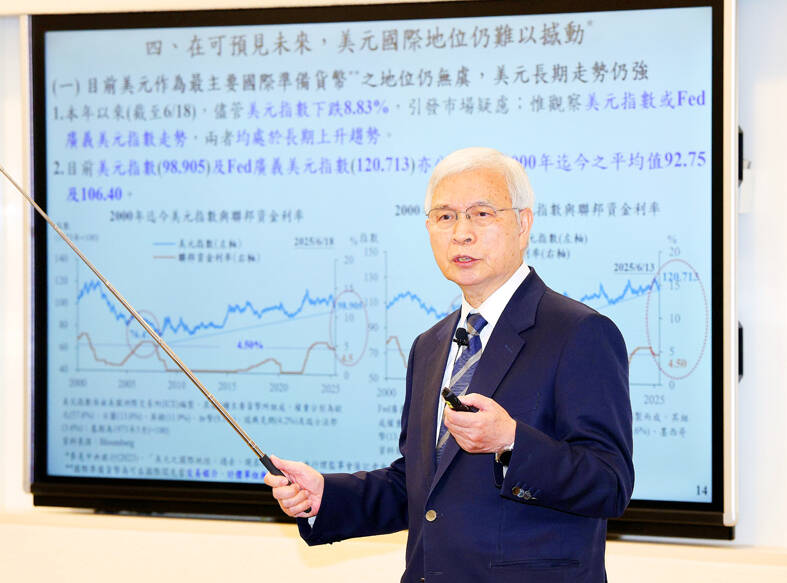The U.S. Treasury and Taiwan’s central bank on Friday said they agreed to continue close consultations on macroeconomic and foreign exchange rate matters and both pledged to avoid manipulating the value of their currencies to gain a competitive advantage.
In a joint statement issued by the U.S. Treasury, they said that there were cases where intervention in foreign exchange markets could be considered.
But this "should be reserved for combating excess volatility and disorderly movements in exchange rates, with the expectation that this tool would be considered equally appropriate for addressing excessively volatile or disorderly depreciation or appreciation."

Photo: CNA
The Treasury had kept Taiwan on its "monitoring list" for extra foreign exchange rate scrutiny as part of its latest semi-annual currency report, which found in June that no major trading partner was manipulating its currency for a trade advantage.
Taiwan’s central bank issued a separate statement in which it reiterated that the U.S. Treasury did not ask for the Taiwan dollar to appreciate.
In May, a surge in the Taiwan dollar’s value to a two-year high against the greenback had
prompted speculation
that this was because of a demand by Washington for an appreciation, which Taiwan’s president denied.
"During the consultations, the U.S. Treasury Department never requested an appreciation of the Taiwan dollar," Taiwan’s central bank said in the statement on Friday. "Moving forward, the bank and the U.S. Treasury Department will continue to exchange views on macroeconomic and exchange rate policies based on our positive working relationship."
Taiwan’s central bank said it committed that starting in 2026, it would move to quarterly disclosures of its currency interventions from its current semi-annual disclosure rate.
The bank said that the statement was unrelated to joint Taiwan-US tariff negotiations as it is not a member of a cabinet-level Taiwan-U.S. Economic and Trade Working Group.

In Italy’s storied gold-making hubs, jewelers are reworking their designs to trim gold content as they race to blunt the effect of record prices and appeal to shoppers watching their budgets. Gold prices hit a record high on Thursday, surging near US$5,600 an ounce, more than double a year ago as geopolitical concerns and jitters over trade pushed investors toward the safe-haven asset. The rally is putting undue pressure on small artisans as they face mounting demands from customers, including international brands, to produce cheaper items, from signature pieces to wedding rings, according to interviews with four independent jewelers in Italy’s main

Japanese Prime Minister Sanae Takaichi has talked up the benefits of a weaker yen in a campaign speech, adopting a tone at odds with her finance ministry, which has refused to rule out any options to counter excessive foreign exchange volatility. Takaichi later softened her stance, saying she did not have a preference for the yen’s direction. “People say the weak yen is bad right now, but for export industries, it’s a major opportunity,” Takaichi said on Saturday at a rally for Liberal Democratic Party candidate Daishiro Yamagiwa in Kanagawa Prefecture ahead of a snap election on Sunday. “Whether it’s selling food or

CONCERNS: Tech companies investing in AI businesses that purchase their products have raised questions among investors that they are artificially propping up demand Nvidia Corp chief executive officer Jensen Huang (黃仁勳) on Saturday said that the company would be participating in OpenAI’s latest funding round, describing it as potentially “the largest investment we’ve ever made.” “We will invest a great deal of money,” Huang told reporters while visiting Taipei. “I believe in OpenAI. The work that they do is incredible. They’re one of the most consequential companies of our time.” Huang did not say exactly how much Nvidia might contribute, but described the investment as “huge.” “Let Sam announce how much he’s going to raise — it’s for him to decide,” Huang said, referring to OpenAI

The global server market is expected to grow 12.8 percent annually this year, with artificial intelligence (AI) servers projected to account for 16.5 percent, driven by continued investment in AI infrastructure by major cloud service providers (CSPs), market researcher TrendForce Corp (集邦科技) said yesterday. Global AI server shipments this year are expected to increase 28 percent year-on-year to more than 2.7 million units, driven by sustained demand from CSPs and government sovereign cloud projects, TrendForce analyst Frank Kung (龔明德) told the Taipei Times. Demand for GPU-based AI servers, including Nvidia Corp’s GB and Vera Rubin rack systems, is expected to remain high,